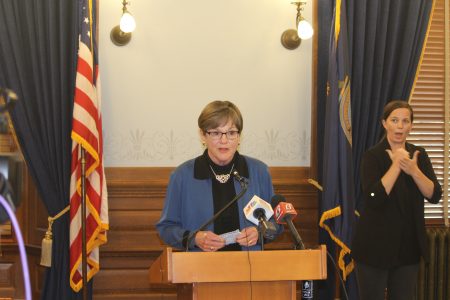Kelly says recovery task force will recommend spending ‘fair chunk’ of CARES Act money on expanded testing program

photo by: Conner Mitchell/Journal-World
Kansas Gov. Laura Kelly speaks at a COVID-19 news conference on Monday, September 14, 2020 at the Kansas Statehouse in Topeka.
Story updated at 6:43 p.m. Monday, Sept. 14:
TOPEKA — Gov. Laura Kelly said Monday that Kansas’ SPARK Taskforce, which is tasked with overseeing economic recovery from the COVID-19 pandemic, will advocate later this week for spending “a fair chunk” of federal CARES Act dollars on expanding the state’s testing program to include tests for asymptomatic individuals.
Kelly said Monday that the state so far has been “parsimonious” in its testing plan, limiting available tests mostly to those showing symptoms of the respiratory virus. Going forward, she said, efforts to do community testing — which so far has been limited to areas of extended outbreaks such as correctional facilities and meatpacking plants — would need to expand drastically.
“We do need to expand our testing,” Kelly said. “There needs to be more of that going on and that will be part of our strategic testing plan going forward.”
Last week, the SPARK Taskforce approved a plan from Dr. Lee Norman, the secretary of Kansas’ Department of Health and Environment, to spend more than $50 million in CARES Act money on expanded testing in key areas like schools and workplaces.
Kelly said the task force would meet Wednesday to give final approval to the monetary value of the expanded testing plan, among other allocations in its third major round of financial disbursements from the March stimulus legislation.
She also said that the State Finance Council, a nine-member committee of Kelly and top state legislative leaders, is tentatively scheduled to meet Thursday and approve the task force recommendations. The State Finance Council concluded last week with a fiery meeting between Kelly and Republican council members over what Kelly said was a vital resolution extending Kansas’ state of disaster declaration through Oct. 15. The extension came only after Republican members demanded that Kelly, a Democrat, agree to a clause in the declaration that she did not intend to order another statewide closure of businesses.
Kelly had said repeatedly that she does not believe another statewide closure order will be necessary, and she reiterated that on Monday. She said she expected Republicans to continue using the meetings for political purposes at least until after the November election.
“It is political season, and I think members of the State Finance Council took the opportunity to make political hay, and I expect they’ll continue to do that until the election’s finally over,” she said.
Also on Monday, Kelly said that she doesn’t anticipate future cuts to state funding for higher education institutions in the current fiscal year budget, but that Kansas and most other states still need direct aid from the federal government, via another stimulus package, to help recoup losses suffered when the pandemic first took hold.
Kansas, for example, was on track to finish fiscal year 2020 on June 30 with nearly $1 million in reserves — now, it faces a $1.3 billion budget shortfall in fiscal year 2021. That’s why, while Kelly said she doesn’t anticipate further cuts to the state’s colleges and universities, it can’t be entirely ruled out — especially if Congress doesn’t act.
“That has to stay open, depending on what happens. But unless we can get help from the federal government to backfill revenues on a state and local level, we will see some serious cuts across the board in education and transportation,” she said. “It can be drastic and very harmful to Kansas.”
Kansas on Monday confirmed 1,513 new cases of COVID-19 since data was last released Friday, bringing the state’s cumulative case total to 49,899. The state also confirmed 23 deaths attributed to the virus since Friday, and COVID-19 has now killed 534 Kansans. The 1,513 new virus cases were out of a total of 9,451 tests, accounting for a positive rate of 16%.
Asked Monday about pictures of crowded parties over the weekend in Lawrence, just off of the University of Kansas campus, Kelly said the lack of a clear message about how to act during an unprecedented pandemic from leaders at the federal, state and local levels is likely to blame for such behavior.
“I think what would have been very helpful is if at the beginning of this, and then throughout, if … there would have been a consistent message from the federal level, the state level and the local level about the importance of wearing a mask and keeping your distance,” she said.
It’s important, Kelly said, that everyone continues to realize the important fact that it’s dependent on everyone to stop the spread of the virus, not just a select few.
— The Associated Press contributed to this story.







